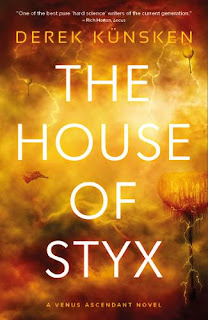The House of Styx - Derek Künsken
Ideally, if you make an important scientific discovery in a place like this, one moreover that gives the first indication of intelligent alien life, you would imagine it would be carefully investigated and treated as a subject of close careful study. In reality however the truth is that any important knowledge or discovery like this is likely to be exploited for financial gains. That’s Künsken's strong point in The House of Styx; amidst the hard-SF examination of how a community of settlers might exist in the harsh fiery environment of Venus, he also gives realistic consideration to the political and financial pressures on colonists indentured to the government and to the banks, not to mention the historical, personal hardships and family rivalries that might prevent people from doing the right thing.
That’s the choice faced by the D’Aquillon family, coureurs des vents, windrunners, who make their living on the lower levels of the sulphuric atmosphere of Venus herding trawlers, bio-engineering the organisms that thrive at this low level where few willingly venture. Indeed the major Earth powers didn’t find much to establish any kind of settlement on Venus so it’s been left to the independent state of Quebec to set up a community and political system that in theory should operate democratically for the benefit of everyone. Obviously that isn’t always the case and because of historical differences during the 40 years that the colony has been established the D’Aquillon family have struggled along mainly independently of the system, even though they have a representative on the Council.
Just as they are being threatened with having their assets nationalised, the family make an astounding discovery on the surface of the planet where, for obvious reasons, few have ventured. Having noticed some unusual wind activity in one of the deepest chasms on the planet, Pascal and his father Geroge-Étienne D’Aquillon have sent probes and cameras down and made an extraordinary discovery. Immediate necessities for survival in these difficult times however means that they are reluctant to make the existence of this discovery known to the rest of the settlement, and they have their own plans for what they have found. The scale and implications of their discovery however are likely to be more far-reaching for Venus and the settlement in the longer term.
Künsken does well to take in the wider considerations of the situation. New worlds are going to require financing and regulation and are always going to come up against the unexpected. He also makes efforts to show how humans would struggle to cope in an alien environment, not just first generation colonists and workers, but other problems will develop and persist because of the way that humanity is hot-wired. This takes on different forms, from artists and poets trying to relate to these new sensations, to characters who try to block it out through sex, drinking and drugs, all of them struggling to maintain a troubled relationship with a difficult planet.
As is often the case with hard SF writing, the human characterisation is fairly basic and weak, with much more effort going into making the science credible and the society workable. The struggle with sexual identity is an attempt to broadens the characterisation, but Pascal’s awkward young adult concerns and urges feel misplaced in the larger story and are very skip-overable. Much of the technological descriptions can also feel superfluous, but the effort to put a scientific basis behind the story is good and the discovery on the surface of Venus offers considerably more scope for surprises and a wider canvas in the next book in the Venus Ascendant series.




Comments
Post a Comment